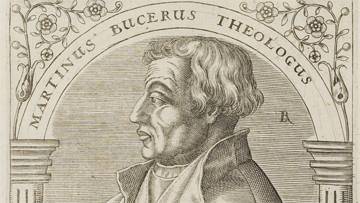You have free articles remaining this month.
Subscribe to the RP Witness for full access to new articles and the complete archives.
The last issue of the Witness reminded readers that 2017 marks the 500th anniversary of Martin Luther’s posting of his 95 Theses, an event used to mark the beginning of the Reformation. Luther was not the sole vessel the Lord used to bring reform. In the coming year, this column will be devoted to highlighting other great Reformers and the special contributions they made. I will begin with Martin Bucer and the theological reformation he brought to church governance.
Bucer was born in 1491. After entering Blackfriars (a Domincan monastery) in 1512 in Heidelberg, he studied the teachings of Erasmus and Luther. After meeting Luther in 1518, he was converted. Three years later he left the monastery to become a priest. In 1522, he ministered in the town of Landstuhl and then Wissembourg. His teachings on the new Reformation doctrines were widely spread. He eventually was excommunicated by Rome, and his life was threatened. He fled to his parents’ home in Strasbourg and in 1524 began a 25-year service there as pastor.
In Strasbourg, Bucer worked tirelessly with others to reform the city. During these years, Bucer’s view of the church proper developed significantly through studies and experience. He was often sought after to help bring truth and conciliation amidst the doctrinal turmoil of the Reformation. He presided over the Regensberg Coloquy in 1541 that brought Protestants and peaceful Catholics together, with Bucer hopeful that they would reach an agreement on several key doctrines. However, the parties did not sign. Nonetheless, in matters such as these, Bucer’s pastoral heart and wisdom were seen and sought.
In 1538, Bucer wrote what he called his “little handbook” on pastoral ministry based on Ezekiel 34:16. This influenced John Calvin and many other Reformers. In Concerning the True Care of Souls,1 Bucer revealed remarkable discernment regarding the nature and essence of the church.
Bucer begins this treatise with the nature of the church, citing Scripture regarding the description of the church as a body of various members who should have total and perfect unity as one body with one Spirit. Their fellowship should not only be “the closest and most united, but also the truest and keenest…with everyone regarding the need of others as in the fullest and most real sense his own and taking it to heart,” he said they were to look after one another in not only spiritual but temporal matters.2 “Bucer’s priesthood of all believers is not only constitutive of the church, but, because it is focused on the community, it also builds up the church.”3 This was in stark contrast to the Catholic emphasis on the papacy and priests.
In the next chapter, Bucer establishes that Christ is the king of the Church. He writes, “We have seen from the aforementioned texts that Christ our Lord alone has and exercises all power and rule in His church and congregation. It is He Himself who rules the church.”4 Here the differentiation between the Catholic and Protestant view of the church and its rule is clearly presented; any earthly representative who claims this authority is invalid.
Bucer then develops how the Lord Jesus carries out His own pastoral office and the work of the church through ordained ministers. He demonstrates that since pastoral work is so great and varied, a need exists for elders to assist the pastor. Bucer develops what would eventually become known as the office of ruling elders. He says that ruling elders are “entrusted with the whole of pastoral office,” and shows that this office is the same as that of bishop in the Bible.5
Following a section on how pastors and elders are to be chosen and ordained by congregational approval, Bucer spends the last half of his book developing further pastoral work from Ezekiel 34:16. He explains the work as 1) searching for the lost; 2) bringing back the straying; 3) binding the wounded; 4) strengthening the weak; and 5) guarding and feeding the healthy.6
When Emperor Charles V forced unity between Catholics and Protestants in the Augsburg Interim of 1548, Bucer opposed it and had to leave Strasbourg. Archbishop Thomas Cranmer invited Bucer to England, and Bucer spent his last years there productively.
After Bucer’s death in 1551 and then King Edward’s in 1553, so opposed was Queen Mary to the Protestant influence Bucer had brought to her country that she denounced him, having his body exhumed in 1555 and burned. However, Queen Elizabeth I restored him to honor a few years later. Bucer’s impact on the church and its proper ordering impacted nations for generations.
______________________________________________________
-
The full title is: Concerning the true care of souls and the correct shepherd-service, how this is to be established and carried out in the Church of Christ. ↩︎
-
Martin Bucer, Concerning the True Care of Souls, Banner of Truth, 2009, 5. ↩︎
-
Willem van ’t Spijker, The Ecclesiastical Offices in the Thought of Martin Bucer, Trans. John Vriend and Lyle D. Bierma, Brill Academic Pub, 1996, 80. ↩︎
-
Bucer, 13-14. ↩︎
-
Bucer, 35. ↩︎
-
This fifth category, though appropriate to the pastoral office, is somewhat a departure from the original meaning of the biblical text of Ezek. 34:16. ↩︎
